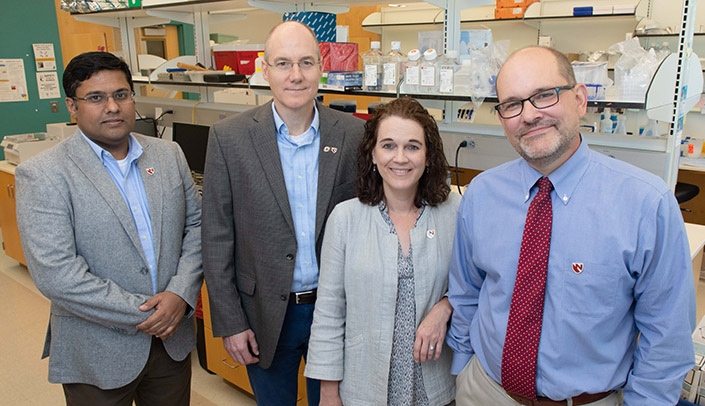UNMC has received $11.8 million over five years to continue research on four projects targeting one of the most difficult-to-treat infections — those caused by methicillin-resistant Staphylococcus aureus (MRSA). The cumulative total of the grant, which was first funded in 2009 by the National Institutes of Health National Institute of Allergy and Infectious Diseases, will be $31 million by the end of 2024.
 |
Alex Horswill, Ph.D., University of Colorado, also is part of the team. |
“We’re learning really interesting details about how bacteria colonize the skin surface and use the nutrients available to them within a human,” said Ken Bayles, Ph.D., principal investigator of the program project grant and director of the UNMC Center for Staphylococcal Research (CSR). “They need nutrition so they’ve adapted to the human host. We have a better understanding of what the bacteria are eating, so we can find ways to eliminate them.
“The bacteria are sophisticated — much more sophisticated than we imagined. We’ve also identified new biofilm targets that are critical for escape to overcome the immune system — it’s a battle. The immune system has evolved to respond to infections, but the staph bacteria have developed many ways to evade, or even prevent a normal response. By learning how staph can cause infection, we can figure out strategies to overcome infection.”
More than 119,000 people suffered from staph infections in the United States in 2017 — and nearly 20,000 died, according to a report released recently by the Centers for Disease Control and Prevention. Between 2012-2017, there was an increase of 3.9% in community-onset staph infections.
The CSR also has produced a “mutant library” — genetic tools researchers around the world can use in their research. At international conferences, like a recent one in Spain, researchers in their presentations frequently mention the Nebraska tools they use in their research. “It helps enhance our own research while providing valuable tools others can use to advance their research,” Dr. Bayles said.
One of the health areas of concern involves patients who have joint replacement surgery. Infections can occur in about 1% to 2% of these patients. Considering about 1 million total joint replacements are performed annually and the number is expected to rise to more than 4 million by 2030, new prevention and treatment discoveries are urgently needed.
“As we become more sophisticated in the clinical setting doing more artificial hips, knees and shoulders, as well as install other devices, they all present opportunities for staph to colonize,” Dr. Bayles said.
“This grant is the foundation of our center for staph research,” he said. “We take the designation very seriously. We also put on a workshop every year. Students come here from all over. If you want to know about staph, this is the place to be.”

Congratulations Vinai, Ken, Tammy, Paul and Alex. I am lucky to be here and have you for colleagues.